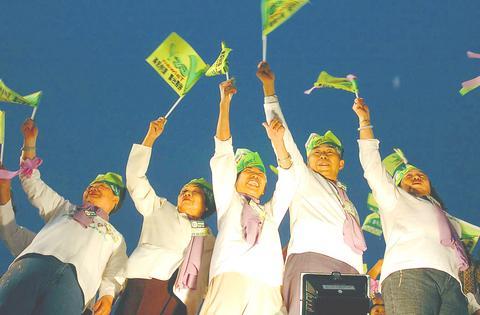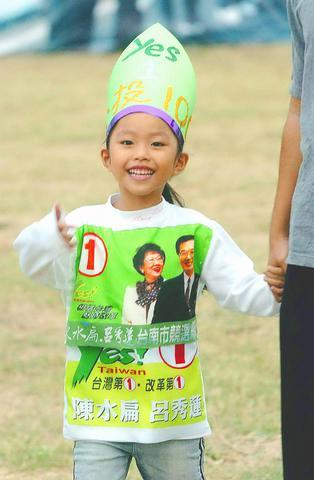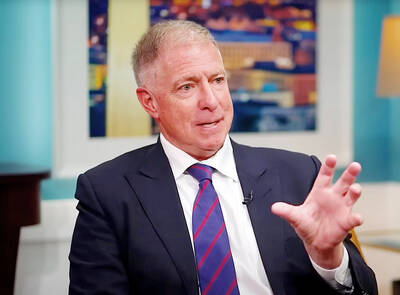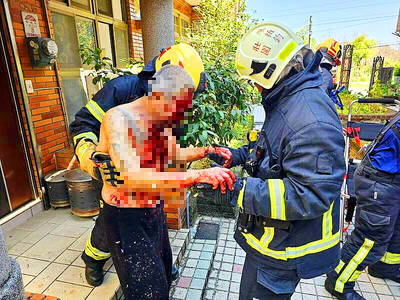This year's presidential election, in which the two opposing political camps are running a neck and neck race, is an acid test of whether Taiwan can further deepen its democracy and continue domestic and constitutional reforms that will ensure the country's overall development, according to political analysts.
It is a race that leaves voters with a choice between progress and regression.
President Chen Shui-bian (

PHOTO: CHIANG YING-YING, TAIPEI TIMES
While this democratic feat wrote a new chapter in Taiwan's fledgling democracy, the DPP, as the county's first opposition party, which has now become the governing party, faces tremendous difficulties in implementing reforms. Unaccustomed to the role of an opposition party, the KMT has fiercely opposed the DPP's reforms in the past four years.
Vice President Annette Lu (
Chiu Hei-yuan (

PHOTO: CHIANG YING-YING, TAIPEI TIMES
"The DPP and the KMT have striking differences in terms of their political characters, which will lead to an entirely different administrative outlook for the country. The differences lie in that the KMT is conservative in reforms, while the DPP asserts progressive reforms," Chiu said.
"Politically, the KMT has been talking about change, which is the party's main slogan in the current presidential campaign, including its strong campaign appeal to change the president. But change could be progressive or regressive.
"Since the KMT has been opposing the reform measures proposed by the DPP, their definition of change could mean no reform at all," Chiu said.
According to Chiu the reforms advocated by the DPP are aimed at promoting a political system that is diametrically opposed to the old KMT system. If the DPP is re-elected, it could continue its reform measures with more efficiency and confidence.
"Those reforms that have been introduced by the DPP government, including the financial reforms and the elimination of corruption, could come to fruition. Being re-elected would boost the DPP's confidence to comprehensively conduct its reforms, but the party would no longer be able to blame the opposition parties for obstructing reforms," Chiu said.
The situation would be very different if the KMT wins the election. The pan-blue camp is expected to discard the reforms advocated by the DPP and go back to its conservative policies.
The KMT has accused the DPP of stirring up chaos in the education system, although the current situation can be traced back to when Lien was premier. Now the KMT is insisting on a conservative approach to restore a modified joint entrance examination system -- a flawed and much criticized system that has had a profound effect on education -- to replace the multiple enrollment schemes for high school students.
In addition, the KMT is likely to procrastinate on judicial reforms, including the passage of the Organic Law of the Judicial Yuan (
The Organic Law of the Judicial Yuan has been pending final approval by the Legislative Yuan for more than a year. According to this bill, the Administrative Supreme Court, the Supreme Court and the Government Official Evaluation Committee will be dismissed and replaced by three new departments under the Judicial Yuan. The new bodies will be the Civil Court, the Criminal Court and the Administrative and Evaluation Court.
"Lien had promised to accelerate the passage of the law during the presidential debate last month. However, when the bill's lobbyists visited him to ask for his support, he simply gave a few perfunctory words and then nothing happened," Chiu said.
In addition, the KMT also opposes the legislation of the Religious Groups Act (宗教團體法), which was drafted by the Executive Yuan as part of a DPP initiative, saying the law would infringe on religious groups' independence in financial and personnel matters.
The KMT's opposition to the bill helped it to win the support of Buddhist Master Wei Chueh (惟覺), who said the law was "destroying religionists" and even called on his followers to boycott the referendum.
Academia Sinica sociologist and national policy advisor to the president Michael Hsiao (蕭新煌) agrees with Chiu that a DPP victory in the election will accelerate domestic reforms, while the KMT will slow the progress that has been made in deepening democracy.
"If the KMT can't even solve its own problems related to the party assets, how could it prove to the public that it has the determination to conduct reforms if it regains power?" Hsiao asked.
"There is no doubt that if the DPP wins the election, those reforms proposed by the DPP, such as the legislative and constitutional reforms, could be dealt with more promptly. However, if Lien is elected, it would be basically impossible to look forward to the KMT initiating reforms, because in the past four years they have done nothing to promote reform," Hsiao said.
That would lead to social instability, as the public would not be able to put their trust in the government. Political stability is also at stake, Hsiao said, expressing doubts as to how the KMT and People First Party will work together in a coalition, as they have much to resolve in the balance of power between the two parties.
In terms of cross-strait relations, Hsiao said a DPP election victory would bring a more clear-cut policy asserting a firm stance on Taiwan's sovereignty.
"The DPP is clear about its Taiwan stance and China will have to come to terms with the reality that China is China, Taiwan is Taiwan. There might not be immediate breakthroughs, but both sides will be able to understand the other's stance clearly," Hsiao said.
However, if the KMT wins the election, Hsiao said, cross-strait relations might move toward a pro-China approach.
"The KMT has been unwilling to clearly define its stance on the relations between China and Taiwan in the run-up to the presidential election. It will be forced to come up with a policy if it regains power, but we don't know what that stance that will be. However, during the ensuing period of ambiguity, China might cash in on the situation and do something to push Taiwan into a difficult situation," Hsiao said.
"Since the KMT has refused to take a stand in the past few years regarding cross-strait relations, people are worried as to where the KMT would lead the country," Hsiao said.
As for whether Taiwan's economy would benefit from a change of leadership, Hsiao expressed doubts about the necessity of such a result.
"The KMT boasts that it created economic prosperity for Taiwan. However, the economic issue should not be simply treated as a domestic matter. Other factors, such as the global economy, influence the economic performance of the country. During its five decades in power the KMT had the opportunity to pursue its economic policy in a consistent manner. But comparing the KMT's 50 years with the DPP's four years, the DPP should be given more time to demonstrate its ability to achieve what it wants to do," Hsiao said.
Political commentator Pu Ta-chung (卜大中) said Chen's re-election, which would give the DPP a second mandate as ruling party, will be a positive lesson to the world's other young democracies.
Pu said a democratic exchange of power like the one brought about in 2000 is very difficult to survive in the early stages, especially when the young and inexperienced ruling party is faced with complicated national affairs, such as economic problems.
These are the problems that Russia and its former satellite states such as Romania, Hungary and Poland faced when the Soviet regime collapsed and was replaced by democratic governments.
"Because of the lack of experience, the young democratic governments of these countries were soon faced with grave economic burdens, making the democracy a total debacle in these countries," Pu said.
"Economically the old power might be able to bring in stability, but politically it creates a setback to the democratic development," Pu said. "It's a pity that the people in eastern Europe and Russia have lost their faith in democracy because of these economic problems."
The importance of the DPP being re-elected is that the whole world is watching whether Taiwan will be able to advance its democratization and pass through the painful process of transition. The question is whether the people of Taiwan can stand the test of time to consolidate their democracy.
Chan Shi-kuei (
Comparing the democratic standards of Chen and Lien, Chan said it's not difficult to see that Chen's proposals for the referendum and a new constitution are consistent with the core value of democracy.
However, Lien's statements about "putting aside the controversy of the sovereignty issue," an approach that favors China and undermines Taiwan's sovereignty, are at odds with the interests of Taiwan, Chan said.

A total lunar eclipse coinciding with the Lantern Festival on March 3 would be Taiwan’s most notable celestial event this year, the Taipei Astronomical Museum said, urging skywatchers not to miss it. There would be four eclipses worldwide this year — two solar eclipses and two lunar eclipses — the museum’s Web site says. Taiwan would be able to observe one of the lunar eclipses in its entirety on March 3. The eclipse would be visible as the moon rises at 5:50pm, already partly shaded by the Earth’s shadow, the museum said. It would peak at about 7:30pm, when the moon would

DEFENSE: The US should cancel the US visas or green cards of relatives of KMT and TPP lawmakers who have been blocking the budget, Grant Newsham said A retired US Marine Corps officer has suggested canceling the US green cards and visas of relatives of opposition Taiwanese lawmakers who have been stalling the review of a proposed NT$1.25 trillion (US$39.7 billion) special defense budget. The Executive Yuan has proposed the budget for major weapons purchases over eight years, from this year to 2033. However, opposition lawmakers have refused to review the proposal, demanding that President William Lai (賴清德) first appear before the Legislative Yuan to answer questions about the proposed budget. On Thursday last week, 37 bipartisan US lawmakers sent a letter to Legislative Speaker Han Kuo-yu (韓國瑜), the heads

A New York-based NGO has launched a global initiative to rename the nation’s overseas missions, most of which operate under the name "Taipei," to "Taiwan Representative Office (TRO)," according to a news release. Ming Chiang (江明信), CEO of Hello Taiwan, announced the campaign at a news conference in Berlin on Monday, coinciding with the World Forum held from Monday through Wednesday, the institution stated in the release. Speaking at the event, Democratic Progressive Party Legislator Huang Jie (黃捷) said she believed this renaming campaign would enable the international community to see Taiwan

Two siblings in their 70s were injured yesterday when they opened a parcel and it exploded, police in Yilan said, adding the brother and sister were both in stable condition. The two siblings, surnamed Hung (洪), had received the parcel two days earlier but did not open it until yesterday, the first day of the Lunar New Year holiday in Taiwan, police said. Chen Chin-cheng (陳金城), head of the Yilan County Government Police Bureau, said the package bore no postmark or names and was labeled only with the siblings’ address. Citing the findings of a